Episodes
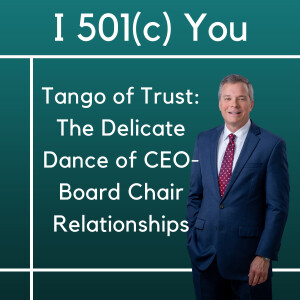
Tuesday Aug 15, 2023
Tuesday Aug 15, 2023
This week, we are discussing the importance of the board chair/CEO relationship and why this relationship is so important to cultivate.
Just like with any relationship, the board chair and CEO need to be intentional about growing their relationship, set expectations, and be clear on each other's role. Without clear expectations, the board chair might overstep into the operations and or the CEO might overstep into governance. Each person has a specific role they should fulfill. The CEO runs the operations of the organization, the board chair leads the board of directors.
Without a working relationship, the CEO or Board Chair can cause problems for the organization, becoming a bottleneck or not providing the support needed to the other.
Timestamps:
(00:40) The Board Chair and CEO relationship
(02:30) Why the relationship can have friction
(02:55) Role ambiguity
(03:35) Communication
(05:00) Conflicting visions for the organization
(05:30) Micromanaging the CEO
(06:25) Decision making authority
(07:00) Personality clash
Join us every week as we release a new podcast with information about how you can be the best board member and provide great service to your organization.
Listen to the podcast on any of the following platforms:
Apple Podcasts
Spotify Podcasts
Amazon
iHeartRadio
Visit us at: www.thecorleycompany.com/podcast
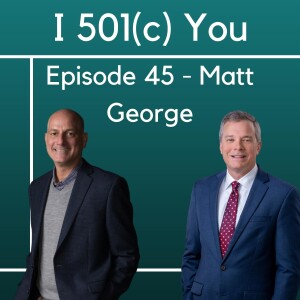
Tuesday Aug 08, 2023
Tuesday Aug 08, 2023
This week we have the pleasure of speaking with Matt George, Executive Director turned nonprofit consultant and leadership coach. Matt is a strong proponent of collaboration, competition, and doing what is ultimately best for the community, even if it means merging organizations.
Matt started his nonprofit career at 16-years old with a fundraiser to help the family of a friend who had cancer. The feeling of raising that money led him to a life in the nonprofit world, joining various organizations as the executive director and merging 5 organizations over his time. He is a true servant leader, always trying to do what is best for the community.
Find Matt’s book, “Nonprofit Game Plan: The Proven Strategy for Nonprofit Success” on Amazon
Timestamps:
(01:05) Introducing Matt George
(03:13) Changing lives and saving lives
(04:20) Being Executive Director of Youth Farm and merging with the Children’s Home
(06:10) Why is Matt different and did you know nonprofits would be your future?
(09:05) Empathy and leadership
(09:40) Why did you write “The Nonprofit Game Plan”?
(12:25) Is having a big heart enough to be an effective nonprofit leader?
(16:20) “A good nonprofit is run like a business”
(24:05) If not for nonprofits, the community will suffer
(25:15) You need to have compassion and passion
(26:26) The benefits of competition and collaboration for nonprofits
(33:20) Merging nonprofit organizations and making a true impact in your community
(36:50) What conditions must exist for a merger to be the appropriate pathway?
(43:35) Recapping with Read
Join us every week as we release a new podcast with information about how you can be the best board member and provide great service to your organization.
Listen to the podcast on any of the following platforms:
Apple Podcasts
Spotify Podcasts
Amazon
iHeartRadio
Visit us at: www.thecorleycompany.com/podcast
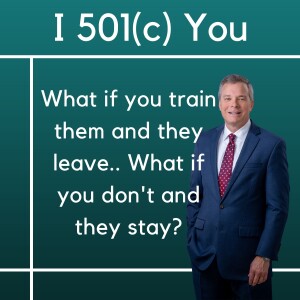
Tuesday Aug 01, 2023
Tuesday Aug 01, 2023
This week, we emphasize the importance of investing in professional development for nonprofit employees. While for-profit organizations readily allocate funds for training, nonprofits often hesitate due to concerns about employee turnover and funding constraints. However, we argue that focusing on the benefits of training, such as improved skills, leadership, and efficiency, can lead to a more skilled and dedicated workforce, ultimately enhancing their ability to fulfill their mission. Let's encourage nonprofits to view professional development as a vital long-term investment rather than a mere expense, enabling them to make a greater impact on their communities.
Timestamps:
00:45 - Nonprofits often do not invest in professional development
02:00 - The board should ensure the CEO feels comfortable investing in professional development
02:47 - Professional development tools and resources
04:10 - Professional development + CEO evaluation
05:00 - Make sure there is time for employees to take the training
Listen to the podcast on any of the following platforms:
YouTube
Apple Podcasts
Spotify Podcasts
Amazon
iHeartRadio
Visit us at: www.thecorleycompany.com/podcast
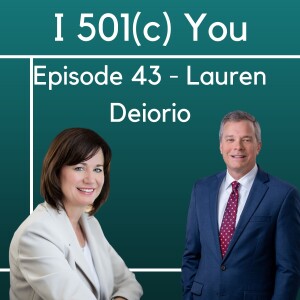
Tuesday Jul 25, 2023
Tuesday Jul 25, 2023
Join us for a captivating conversation centered around the success of nonprofit boards and organizations!
This week, we have the distinct pleasure of speaking with Lauren Deiorio, the President and Executive Director of the Community Foundation for Ocala/Marion County.
We discuss the initiatives that are driving positive change for nonprofits in the Ocala/Marion County region as Lauren shares her invaluable insights and advice on fostering meaningful collaborations within the nonprofit sector.
Don't miss out on this engaging discussion that will leave you empowered to make a difference and contribute to the thriving success of nonprofits.
Timestamps:
00:52 - How Lauren got into nonprofit work
04:15 - Explaining the Roadmap to Success
07:45 - How should excellence be defined for a nonprofit board?
11:48 - Boards are the stewards of the public good
13:50 - Importance of D&O Insurance
17:05 - Why should nonprofits collaborate?
23:50 - Do board members struggle with collaboration?
26:05 - Duties and expectations document
30:00 - What advice do you have for EDs or board chairs?
33:20 - Recapping with Read
Listen to the podcast on any of the following platforms:
YouTube
Apple Podcasts
Spotify Podcasts
Amazon
iHeartRadio
Visit us at: www.thecorleycompany.com/podcast
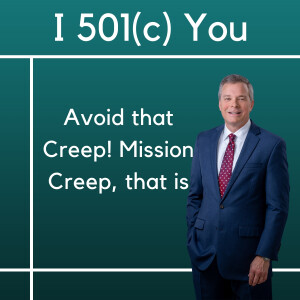
Tuesday Jul 18, 2023
Tuesday Jul 18, 2023
Today, we are discussing the importance of avoiding mission creep. Mission creep can be a major disruptor for a sustainable organization. What can start as a sustainable, impactful program can end up being dissolved, or worse, it can bring the organization down with it.
This is why we start all of our conversations with nonprofit boards with the mission. Asking each person their interpretation of the mission, in hopes to align everyone for the meeting.
Overall, stick to programs and activities that support your mission.
Listen to the podcast on any of the following platforms:
YouTube
Apple Podcasts
Spotify Podcasts
Amazon
iHeartRadio
Visit us at: www.thecorleycompany.com/podcast

Tuesday Jul 11, 2023
Tuesday Jul 11, 2023
Many of us are familiar with for-profit and non-profit organizations. However, this week, we have the pleasure of speaking with two individuals who have joined forces to revolutionize the non-profit sector. Meet Michael Oxman and Larry Clark, the visionaries behind No Margin, No Mission. Established in 2011, No Margin, No Mission aims to create financially sustainable organizations that achieve greater social impact.
With their expertise and dedication, Mike and Larry provide invaluable support to non-profits, equipping them with the tools and knowledge needed to step off the fundraising treadmill and pave the way towards self-sufficiency. By fostering financial stability, No Margin, No Mission opens up a world of possibilities for non-profit organizations to expand their impact and create lasting change in their communities.
No Margin, No Mission Website
Timestamps:00:50 - Interview starts
01:25 - How Mike got involved with No Margin, No Mission
04:22 - How Larry got involved with No Margin, No Mission
05:50 - What is No Margin, No Mission?
10:10 - Why should a nonprofit consider earned income and how do they do it?
14:20 - What behaviors or characteristics need to exist before considering an earned income opportunity?
17:40 - What role do board members play in earned income?
19:10 - What opportunities are created when you pursue earned income?
22:20 - Real life examples
26:15 - Rippling effects of earned income
35:35 - Recapping with Read
Join us every week as we release a new podcast with information about how you can be the best board member and provide great service to your organization.
Listen to the podcast on any of the following platforms:
YouTube
Apple Podcasts
Spotify Podcasts
Amazon
iHeartRadio
Visit us at: www.thecorleycompany.com/podcast
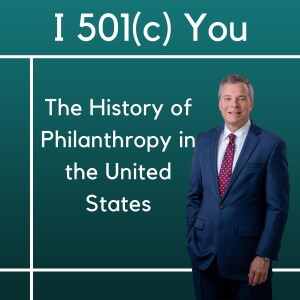
Tuesday Jul 04, 2023
Tuesday Jul 04, 2023
On this 4th of July, join us as we embark on a reflective journey through the rich tapestry of philanthropy in the United States.
In this episode, we delve into the history of philanthropy, shedding light on the remarkable individuals who played pivotal roles during its early stages. Additionally, we present compelling statistics from the latest year, 2021, to provide you with a comprehensive snapshot of the importance of individual giving.
So sit back, relax, and let us transport you to a world where generosity knows no bounds. This is a celebration of American philanthropy, an ode to its enduring legacy, and an invitation to participate in the spirit of giving.
Sources: Giving USA
Timestamps:
00:30 - Statistics from Giving USA
01:40 - History of philanthropy in the USA
05:00 - Philanthropy today
06:00 - Why is the US so philanthropic?
Listen to the podcast on any of the following platforms:
YouTube
Apple Podcasts
Spotify Podcasts
Amazon
iHeartRadio
Visit us at: www.thecorleycompany.com/podcast
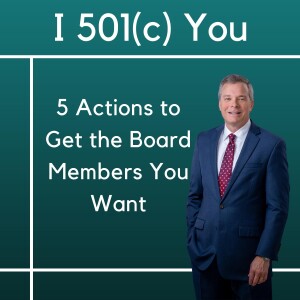
Tuesday Jun 27, 2023
Tuesday Jun 27, 2023
Michael recently had the opportunity to speak to the Sumter County Nonprofit Coalition about "Getting the Board Members You Want." We believe this topic is so important, we recorded a podcast about it. This episode covers 5 actions you can take as a nonprofit CEO/ED or board member to recruit and attract the board members your organization wants.
Timestamps:
00:00 - Episode begins
01:20 - Create awareness
02:10 - Clarify your mission
02:50 - Demonstrate leadership
03:45 - Implement proper governance
05:00 - Explain the impact
Join us every week as we release a new podcast with information about how you can be the best board member and provide great service to your organization.
Listen to the podcast on any of the following platforms:
YouTube
Apple Podcasts
Spotify Podcasts
Amazon
iHeartRadio
Visit us at: www.thecorleycompany.com/podcast
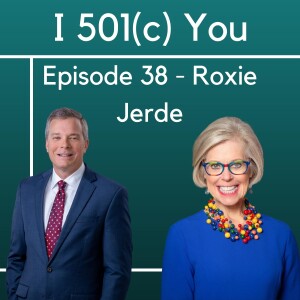
Tuesday Jun 20, 2023
Tuesday Jun 20, 2023
This week, we are fortunate to delve into the world of community foundations with none other than Roxie Jerde, the President and CEO of the Community Foundation of Sarasota County. Roxie provides us with invaluable insights into the pivotal role that community foundations play in the nonprofit ecosystem.
A community foundation serves as a driving force for community betterment, striving to uplift every aspect of the community. Their fundamental purpose is to foster the community's well-being by supporting diverse nonprofit organizations, individuals, and initiatives. Not only do they make a direct impact through their assistance, but they also facilitate the collaboration of various organizations that may not have otherwise crossed paths.
With Roxie Jerde's expertise, we gain a profound understanding of how community foundations diligently work towards the greater good and positively influence the entire community.
Timestamps:
00:50 - Roxie introduces herself and her career
06:05 - What is a community foundation?
09:20 - The Community Foundation’s role in working with local nonprofits
11:45 - How do you understand all these nonprofits?
14:15 - Why can the Community Foundation make this societal change?
16:25 - How do you decide what issues to address?
18:50 - The Community Foundation is a resource
22:25 - What is the board’s role on a community foundation?
26:00 - How do boards differ on a private foundation versus a community foundation?
29:30 - Anything else?
32:18 - Recapping with Read
Join us every week as we release a new podcast with information about how you can be the best board member and provide great service to your organization.
Listen to the podcast on any of the following platforms:
YouTube
Apple Podcasts
Spotify Podcasts
Amazon
iHeartRadio
Visit us at: www.thecorleycompany.com/podcast
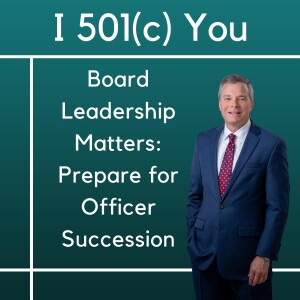
Tuesday Jun 13, 2023
Tuesday Jun 13, 2023
While planning for your next group of board members is crucial, it's your strategic preparation for officer positions that truly sets the stage. Leadership can make or break an organization. With this in mind, join us for a conversation about the importance of succession planning for your board's officer positions.
Timestamps:
00:35 - Episode starts
01:12 - Officer positions
02:00 - Be intentional about leadership, look at the skills you want in these positions
03:16 - Identify those who you will want to be an officer in the future
03:45 - Have a thorough onboarding process for the officers
Join us every week as we release a new podcast with information about how you can be the best board member and provide great service to your organization.
Listen to the podcast on any of the following platforms:
YouTube
Apple Podcasts
Spotify Podcasts
Amazon
iHeartRadio
Visit us at: www.thecorleycompany.com/podcast






